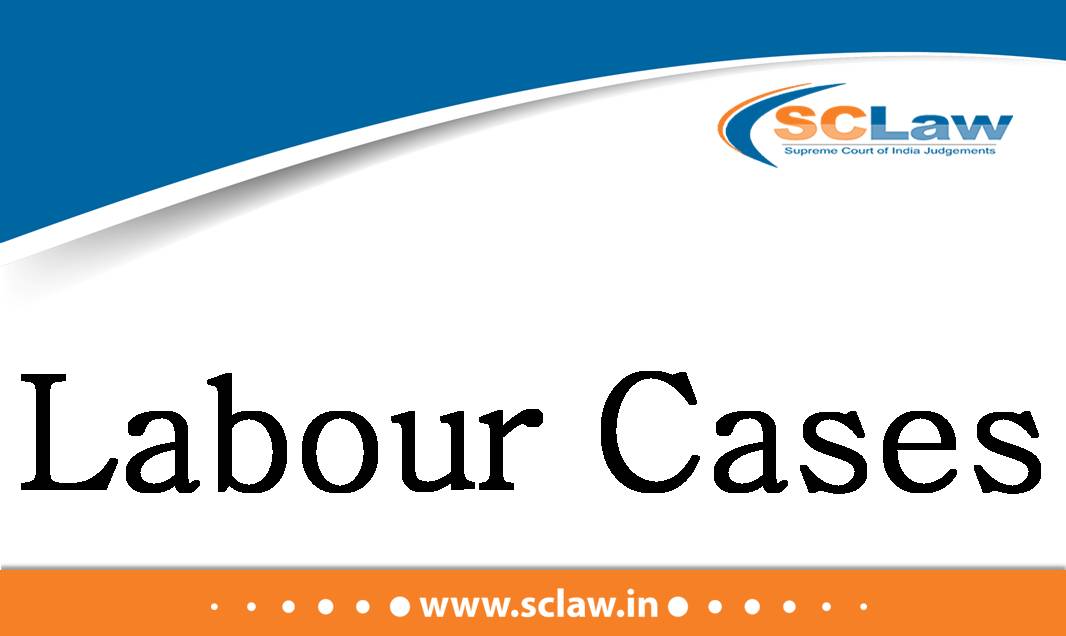Reinstatement–Claim found to be stale as it was filed after about 8 years of the alleged order of termination.
2007(5) LAW HERALD (SC) 3938 IN THE SUPREME COURT OF INDIA Before The Hon’ble Mr. Justice Dr. Arijit Pasayat The Hon’ble Mr. Justice D.K. Jain Civil Appeal No. 1000…
Surplus land–Post vesting purchaser–Name entered in mutation–Entitled to opportunity of being heard on merits.
2007(5) LAW HERALD (SC) 3935 IN THE SUPREME COURT OF INDIA Before The Hon’ble Mr. Justice Tarun Chatterjee The Hon’ble Mr. Justice Dalveer Bhandari Civil Appeal No. 1094…
Select List–Where rules do not specify the validity of select list, the validity of select list should be one year.
2007(5) LAW HERALD (SC) 3930 IN THE SUPREME COURT OF INDIA Before The Hon’ble Mr. Justice S.B. Sinha The Hon’ble Mr. Justice Harjit Singh Bedi Civil Appeal No.…
Termination–Reservation–In advertisement, authorities failed to mention in regard to reservation for handicapped person at the outset–Appellants who were handicapped person were appointed–On Contempt petition State cancelled the selection and terminated the service–Service restored with backwages.
2007(5) LAW HERALD (SC) 3917 IN THE SUPREME COURT OF INDIA Before The Hon’ble Mr. Justice S.B. Sinha The Hon’ble Mr. Justice Harjit Singh Bedi Civil Appeal No. 3984 of…
Registration of FIR–High Court should discourage the practice of filing a writ petition or petition under Section 482 Cr.P.C. simply because a person has a grievance that his FIR has not been registered by the police, or after being registered, proper investigation has not been done by the police.
2007(5) LAW HERALD (SC) 3910 IN THE SUPREME COURT OF INDIA Before The Hon’ble Mr. Justice A.K. Mathur The Hon’ble Mr. Justice Markandey Katju Criminal Appeal No. 1685 of…
Writ of Mandamus–Courts cannot issue any direction to the Parliament or to the State legislature to enact a particular kind of law.
2007(5) LAW HERALD (SC) 3908 IN THE SUPREME COURT OF INDIA Before The Hon’ble Mr. Justice G.P. Mathur The Hon’ble Mr. Justice P.K. Balasubramanyan Civil Appeal No. 478 of 2006…
Gratuity–Where a benefit has been extended by the Authorities under the Act to the workman by recording a finding that the applicant had completed requisite service of 5 years to be eligible to get gratuity–High Court should not interfere with such findings even if another view is possible.
2007(5) LAW HERALD (SC) 3904 IN THE SUPREME COURT OF INDIA Before The Hon’ble Mr. Justice C.K. Thakker The Hon’ble Mr. Justice Tarun Chatterjee Civil Appeal No. 3889 of…
Rents Law–A Member of a tenant co-partnership Housing Societies is not a tenant within the meaning of section 5(11) of the Rent Act. Rents Law–The question regarding legality or otherwise of the creation of tenancy right by the Member, which amounts to transfer of interest of a Member in the property of cooperative society, can be decided by raising a dispute before the Co-operative Court.
2007(5) LAW HERALD (SC) 3877 IN THE SUPREME COURT OF INDIA Before The Hon’ble Mr. Justice B.N. Agrawal The Hon’ble Mr. Justice P.P. Naolekar Civil Appeal Nos. 2990-2991 of 2005…
Service and Labour Law–Industrial Disputes Act,1947, Section 25F–Termination–Workman appointed as a Security Guard in the Telecom Department on 1-10-1996–Terminated from service on 1-6-1999–Termination challenged on the ground that provisions of section 25F of the I D. Act had not complied with as he had completed 240 days of service before the impugned order
2007(5) LAW HERALD (SC) 3874 IN THE SUPREME COURT OF INDIA Before The Hon’ble Mr. Justice Tarun Chatterjee The Hon’ble Mr. Justice P. Sathasivam Civil Appeal No. 4264…
Will–Execution of–Suspicious circumstances–Attesting witness not known to her and even it was not known why she was called and who called her to attest the will is shrouded in mystery–Several cuttings and over writings were also in the will.
2007(5) LAW HERALD (SC) 3868 IN THE SUPREME COURT OF INDIA Before The Hon’ble Mr. Justice S.B. Sinha The Hon’ble Mr. Justice Markandey Katju Civil Appeal No. 4608 of 2003…














